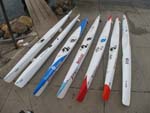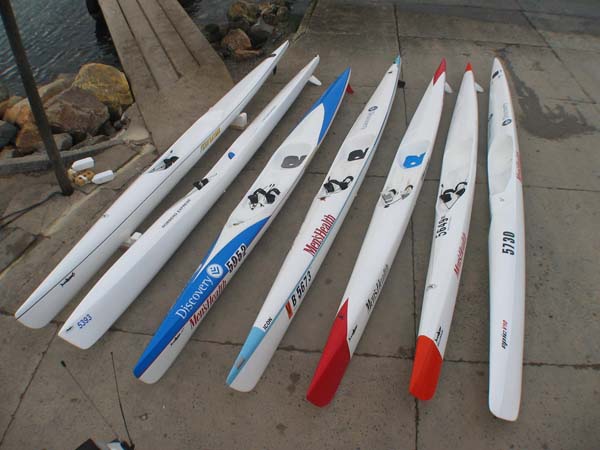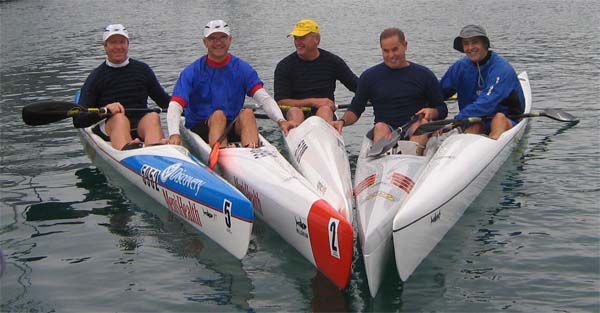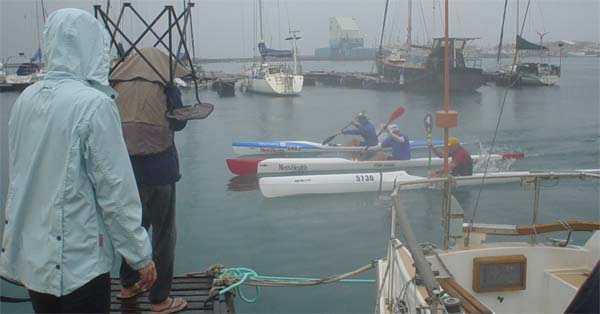Surfski Shootout
 What's the fastest ski on the market?
What's the fastest ski on the market?
Ask any six paddlers and you’ll likely get six different answers… And you can bet that the answer will likely be: “the ski that I own”!
A group of Cape paddlers got together on Sunday to try to answer the question objectively. This article describes the method used, the results and conclusions…
Method
The first step was to decide how to measure the performance of each ski. Various suggestions were made but we finally decided on an extremely simple formula:
- Paddle each ski as fast as possible over a short, flat course.
- Paddle each ski twice.
- Make sure the ski was up to speed on entering the course.
By averaging the speeds achieved by the paddlers, we should be able to draw conclusions about the performance of the skis.
The Event
Between them, the group was able to obtain seven skis:
|
|
Epic V10 |
Fenn Mako 6 |
Fenn XT |
Fenn Mako |
Fenn Millennium |
Custom Kayaks Icon |
Knysna Kayaks Robberg Express |
|
Weight (kg) |
17.5 |
17.1 |
18.3 |
17 |
18.1 |
18.3 |
18.1 |
|
Weight (lb) |
38.58 |
37.70 |
40.34 |
37.48 |
39.90 |
40.34 |
39.90 |

The group comprised three B-grade paddlers:
|
Paddler |
Paddler Weight (kg) |
Paddler Weight (lb) |
|
A |
94 |
207 |
|
B |
82 |
181 |
|
C |
75 |
165 |

The test took place in Hout Bay harbour, the course being laid alongside the yacht jetties. The distance between the timing marks was 52m.
The weather was not ideal; a fresh westerly breeze bringing cold driving rain. The course was protected though and the water calm.




The Results
The table below shows the average speeds (in km/h) achieved by the three paddlers.
|
|
Epic V10 |
Fenn Mako 6 |
Fenn XT |
Fenn Mako |
Fenn Millennium |
Custom Kayaks Icon |
Knysna Kayaks Robberg Express |
Average |
|
A |
14.80 |
14.58 |
14.01 |
13.80 |
13.92 |
13.34 |
13.76 |
14.03 |
|
B |
14.10 |
14.70 |
12.96 |
13.59 |
13.66 |
14.05 |
13.19 |
13.75 |
|
C |
13.27 |
13.96 |
12.80 |
13.66 |
13.38 |
13.53 |
13.24 |
13.41 |
|
Average |
14.06 |
14.41 |
13.26 |
13.68 |
13.65 |
13.64 |
13.40 |
|
|
Ranking |
2 |
1 |
7 |
3 |
4 |
5 |
6 |
|
|
Difference |
0.36 |
0.00 |
1.16 |
0.73 |
0.76 |
0.77 |
1.02 |
|
For our transatlantic cousins, the same table is presented below in mph.
|
|
Epic V10 |
Fenn Mako 6 |
Fenn XT |
Fenn Mako |
Fenn Millennium |
Custom Kayaks Icon |
Knysna Kayaks Robberg Express |
Average |
|
A |
9.20 |
9.06 |
8.71 |
8.57 |
8.65 |
8.29 |
8.55 |
8.72 |
|
B |
8.76 |
9.14 |
8.05 |
8.45 |
8.49 |
8.73 |
8.19 |
8.54 |
|
C |
8.25 |
8.67 |
7.95 |
8.49 |
8.32 |
8.41 |
8.23 |
8.33 |
|
Average |
8.74 |
8.96 |
8.24 |
8.50 |
8.48 |
8.48 |
8.33 |
|
|
Ranking |
2 |
1 |
7 |
3 |
4 |
5 |
6 |
|
|
Difference |
0.22 |
0.00 |
0.72 |
0.46 |
0.47 |
0.48 |
0.63 |
|
The paddlers were asked to rank the stability of the skis from 1 (most stable) to 7 (least stable). The average results are tabulated below:
|
|
Epic V10 |
Fenn Mako 6 |
Fenn XT |
Fenn Mako |
Fenn Millennium |
Custom Kayaks Icon |
Knysna Kayaks Robberg Express |
|
Average |
2.75 |
2.50 |
1.00 |
5.25 |
6.25 |
6.50 |
3.75 |

Comments
Although the exercise did not simulate a realistic situation (flat water, sprints, various leg length skis), we believe that certain features in the data suggest credibility in the results as a whole. For example:
Paddler B owns the Icon, and being used to it, achieved by far the best results of the three in it.
Paddler A owns the V10, and achieved the best results in it.
Conclusions
We believe that several conclusions can be drawn with a fair degree of accuracy:
In terms of the top speed achieved by the participants, the skis could be grouped as follows:
- Group 1 (fastest): Epic V10 and Fenn Mako 6
- Group 2: Fenn Millennium, Fenn Mako, Icon
- Group 3: Robberg Express
- Group 4 (slowest): Fenn XT
In terms of stability:
- Group 1 (most stable): Fenn XT
- Group 2: Epic V10 and Fenn Mako 6
- Group 3: Robberg Express
- Group 4: Fenn Mako
- Group 5 (least stable): Fenn Millennium and Icon
Note: It should be emphasised that these results were achieved by B-grade paddlers. It would be interesting to see how the results might change given a group of elite paddlers. One might expect stability to take a lesser role, for example.
Next Steps
Although we feel that the exercise was useful and yielded fairly conclusive results, we intend to perform a number of other tests including:
Comparative Effort at Race Speed
B-grade paddlers like us generally paddle at between 10.5 and 11.5 km/h during an hour-long race. It would be interesting to compare the effort required to maintain such a speed for 1km on each ski.
To perform the test, each paddler will use a Garmin GPS/HR monitor to ensure that he paddles at a consistent 11km/h over a 1km course. Every paddler will paddle every ski. By comparing the average heart rates when paddling each ski, it should be possible to draw conclusions about the effort expended.
For example the result might look like:
|
|
Ski A |
Ski B |
Ski C |
Ski D |
Ski E |
Ski F |
Ski G |
|
Paddler A (BPM) |
140 |
150 |
130 |
135 |
120 |
122 |
123 |
The conclusion drawn from the above data would be that Ski E was the easiest to paddle at 11km/h because the average HR over the 1km course was the lowest.
Measurement of Drag
By using a pole, a catamaran and a strain gauge, it should be possible to measure the drag imposed by each ski at various speeds and weights.
Stay tuned...
Thanks
Thanks to all the guys who took part: Dale, David, Tom, and especially the timekeepers who were soaked and frozen: Johan, Alain & Janet.

